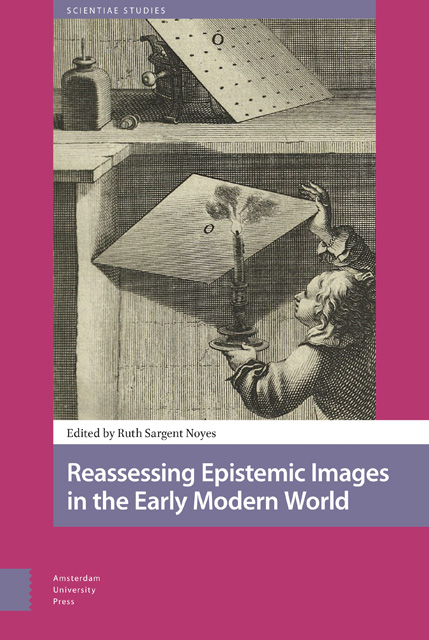Book contents
- Frontmatter
- Dedication
- Table of Contents
- 1 Prologue: For a Metaphorology of Engraving: From Epistemic Images to an Imaged Epistemology
- 2 Introduction: Pittura filosofica: Etching Galileo’s Sunspots and the Discursive Field of Early Modern Epistemic Images
- Part 1 Approaches to Print Matrices
- Part 2 Imprints as Instruments
- Part 3 Imprint, Knowledge, and Affect
- Bibliography
- Index
1 - Prologue: For a Metaphorology of Engraving: From Epistemic Images to an Imaged Epistemology
Published online by Cambridge University Press: 15 June 2023
- Frontmatter
- Dedication
- Table of Contents
- 1 Prologue: For a Metaphorology of Engraving: From Epistemic Images to an Imaged Epistemology
- 2 Introduction: Pittura filosofica: Etching Galileo’s Sunspots and the Discursive Field of Early Modern Epistemic Images
- Part 1 Approaches to Print Matrices
- Part 2 Imprints as Instruments
- Part 3 Imprint, Knowledge, and Affect
- Bibliography
- Index
Summary
Abstract
The volume preface takes up the question of the reversibility between knowledge and image through the issue of engraving (and intaglio printmaking more broadly) as a metaphor for thinking knowledge in the early modern period. Reflecting on period epistemic-artistic metaphorology of engraving that enabled a thinking through of the actual plastic processes entailed in the reception and production of knowledge, this chapter interrogates how a new technique such as engraving generated or reactivated and thereby transformed rich metaphorical networks, enabling a re-thinking of certain issues at the intersection of knowledge, belief, and vision in early modernity.
Keywords: metaphorology, engraving, Claude Mellan, media studies, mnemonics, theology of images
In the guise of a preface to this volume, and as an overview and extension of the authors’ reflections contributing to an exploration of prints’ epistemic dimension, I would like to take up the question of the reversibility between knowledge and image through the issue of engraving (and intaglio printmaking more broadly) as a metaphor for thinking knowledge. In his Paradigms for a Metaphorology of 1960, Hans Blumenberg interrogates the place of metaphors in Western thought. He thus underscores how metaphors (e.g. light as a metaphor for truth, or the legibility of the world, to which he dedicated a book), far from simple ornaments of philosophical discourse or efficacious didactic means, allow for a consideration of that which resists conceptualization. Metaphors constitute Grundbestände, which is to say “fundamental elements” “from which and upon which philosophy operates, and do not allow themselves to be overtaken within a conceptuality.” That within this reflection on metaphorology artistic metaphors number among Western thought’s fundamental elements can be confirmed, for example, in the metaphor of sculpture in Aristotle’s theory of causality (doctrine of the four causes). They have enabled a thinking through of the actual plastic processes entailed in the reception and production of knowledge. Among such epistemic-artistic metaphors is that of engraving. This begs the question: how might a new technique such as engraving – a term that refers at once to procedure and product – generate or reactivate and thereby transform rich metaphorical networks, enabling a re-thinking of certain issues at the intersection of knowledge, belief, and vision in early modernity?
- Type
- Chapter
- Information
- Publisher: Amsterdam University PressPrint publication year: 2022



